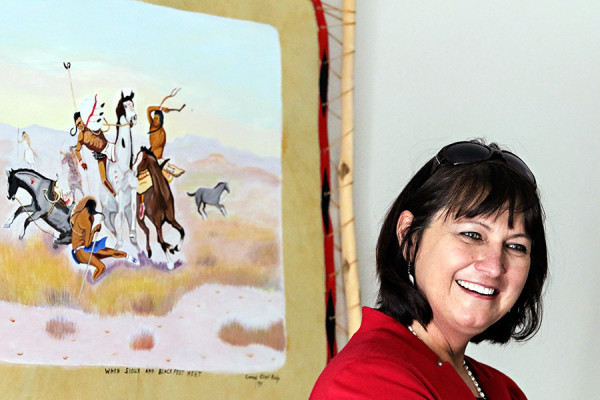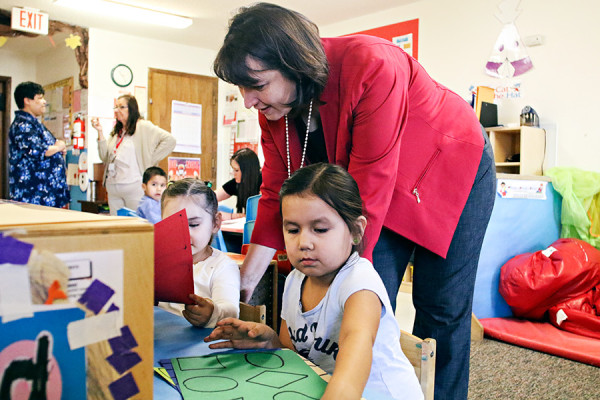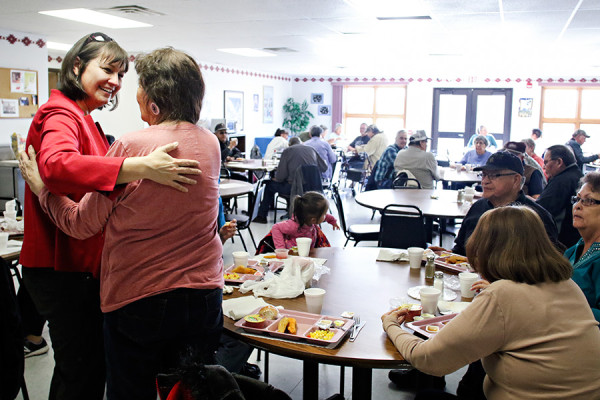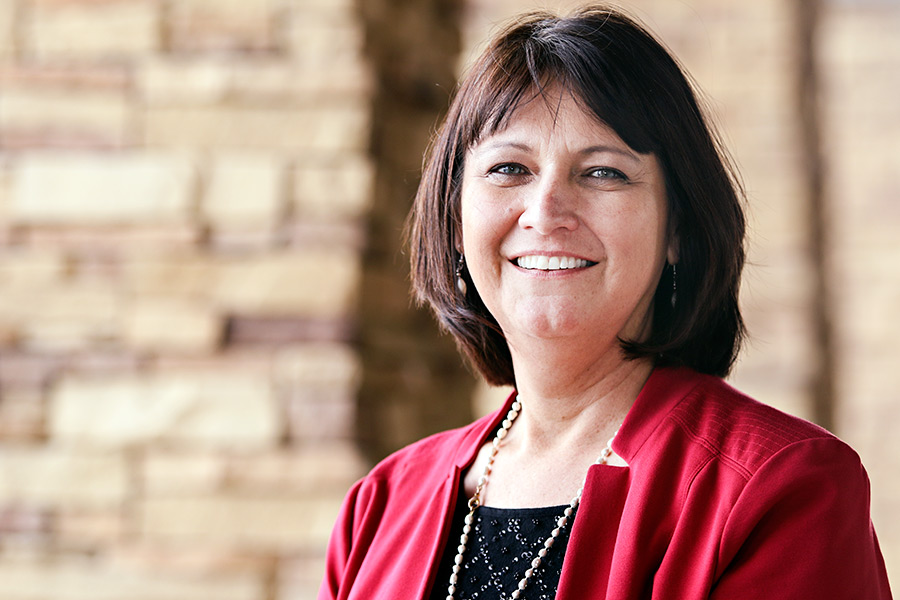MISSOULA – It’s hard to count the number of people at this mid-February Democratic fundraiser, with supporters streaming in and out of an historic home in the university district, somewhat hidden in the shadows as evening approaches.
Much of Missoula’s Democratic base is in attendance at one point or another, from the mayor to various city council members and state lawmakers. There are also dozens of supporters who are asked to pull out their checkbooks and give to the campaign.
Another pair of attendees, barely old enough to vote, felt compelled to check out the fundraiser after taking interest in politics due to their work with Forward Montana Foundation, a youth-led organization dedicated to electing a new generation of progressive leaders.
“I don’t know anything about Denise Juneau,” Caleb Horton, 19, says. “That’s why I’m here.”
In the midst of all the hand-shaking and back-slapping stands Juneau, the presumptive Democratic candidate for Montana’s lone seat in the U.S. House of Representatives.
For all the chatter surrounding her, Juneau is one of the quietest people in the room. But when she starts her speech, the teacher used to commanding a classroom emerges, assured and direct. She thanks those in attendance before touching on her record as the state’s Superintendent of Public Instruction, saying her work there improving graduation rates in the state and pushing back against one-size-fits-all federal government policies puts her in a position of understanding divisiveness, but also how to broach it.
“My entire career has been about the future and making it a better one,” Juneau says. “It’s about being optimistic, about making sure we’re not building a bigger fence but a longer table.”
This is the foundation on which Juneau is building her campaign, the idea that the caustic environment in Congress can be overcome with diverse, new voices.
But while it is otherwise optimistic, Juneau’s campaign faces a significant headwind, seeking a seat Republicans have held since Rick Hill took it over from Democrat Pat Williams in 1997. U.S. Rep. Ryan Zinke, a Republican from Whitefish, has strong support in the state after serving his first term in Congress from 2014 to now, and a healthy approval rating of 44 percent, according to a December poll from Montana State University Billings.
“Big picture, it looks like an uphill climb for Juneau,” Rob Saldin, political science professor at the University of Montana, said. “Zinke is the incumbent, and incumbents almost always win. It’s a huge, huge advantage.”
Juneau understands the political landscape; she acknowledged that her fundraising will likely fall behind Zinke’s and that his incumbency presents a significant challenge.
But she said such aspects are part of running for national office and remains undeterred.
“My life’s really been a series of opportunities,” Juneau said about a month before the Missoula fundraiser, driving through Browning in January. “It’s been doors opening and me walking through them.”

Every person’s story has a beginning, and for Denise Juneau, that beginning was in the Bay Area in California, worlds away from life on the Blackfeet Reservation.
Her parents, Stan and Carol Juneau, met in Oakland, despite coming from Browning and North Dakota, respectively. They had both moved to the Bay Area as part of the federal Indian Relocation Act of 1956, which encouraged American Indians to leave their reservations to learn vocational skills and assimilate into the country’s general population.
The couple married, and Denise and her brother, Ron, were born. Denise, now 48, became an enrolled member of the Mandan Hidatsa Tribes of North Dakota, and a descendent of the Blackfeet Tribe. Her family’s ancestry dates back to before Montana was a state, Juneau said.
Her parents decided to move to Billings where they would both earn degrees at Eastern Montana College, now known as Montana State University Billings. Once their degrees were earned, Stan and Carol Juneau moved their family to Browning, the nucleus of the Blackfeet Reservation, where they would work as teachers in the public school district.
They moved when Denise was in second grade, and they crammed into a tiny, ground-floor apartment. Not long after, they moved to a house in the Last Star development, where she and her brother would run with packs of kids, riding bikes and playing basketball.
“There are a lot of pets buried in that backyard,” she said as she drove by her old house earlier this year.
Eventually, the family moved to a house closer to the high school, where Juneau lived from seventh grade through high school. Revisiting the house in January for the first time since her parents moved to Great Falls about six years ago, Juneau walked around what is now a bustling bed and breakfast and noted how much it seems to have changed.
“It’s so tiny,” she said, standing in her high school bedroom. “I remember three or four girls getting ready for prom in here.”
A doorframe offered up a family height-and-growth chart, with dates and ages and names still written on the wood. It was the visual equivalent to nearly every conversation Juneau would have with people in Browning that day: reminiscing about the past in a town with a long memory.
“It’ll always be my home,” she said, driving through town. “It’s what I know.”
At the senior citizens center, she’s largely greeted with “I’ve seen you on the TV!” and hugs. After the visit, Juneau remarked about the changing political culture in Browning as the “old guard” of civic involvement continues to age out.
“It’s really changed,” she said.
With every stop on her trip, she tells people to make sure their family members and friends are registered to vote. Voter turnout on the reservations will be a significant part of her campaign, she said later.
Driving by the high school, Juneau spoke about graduating in 1985 before going off to Montana State University in Bozeman and earning a bachelor’s degree in English. Juneau acknowledged that while in college, she was twice convicted of driving under the influence, once in 1986 and once in 1989. After news of the convictions surfaced in November, Juneau said she learned from past mistakes.
“Thirty years ago, I made some poor decisions. I was accountable to those decisions,” Juneau said. “I think it’s a good lesson that you can make mistakes, but as long as you’re accountable to them and you can rise up and brush yourself off.”
Upon graduating college, Juneau went on to earn a master’s degree in education from the Harvard Graduate School of Education. Her first teaching job was back in her mother’s home state of North Dakota, then she took a job in Browning. She left teaching work for the Office of Public Instruction, and then decided to pursue a different educational course and earned her juris doctorate from The Law School at the University of Montana in 2004.
Leaving the Blackfeet Reservation and going to school in Billings and Boston were eye-opening experiences, she said, because it taught her about life outside the reservation.
“I learned that the world is really diverse,” she said.
She clerked for the Montana Supreme Court for a year and worked for a national law firm for a few months. But then, in 2005, the state Legislature provided funding for the Indian Education for All, and Juneau went back to work with OPI, as director of Indian Education.
She won the race for Superintendent of Public Schools in 2008, becoming the first American Indian in the country ever elected to a statewide office. She was reelected in 2012.
Juneau said her urge to work in Montana stemmed from understanding her privileged position in Browning growing up – she had two employed parents who were still married, who made sure she was prepared for life after high school. This taught her that everyone should have as much support as she did as a student.
“That was really instilled in me as well, that you should always fight for the underdog, that everyone should have a seat at the table,” Juneau said. “I don’t know any other way to be. I always have to be authentic to myself, and I have to be true to my values.”

In her role as state superintendent, Juneau touts her work with the Graduation Matters Montana program, which brought together business, education, community leaders, students, and families in more than 50 communities to ensure every student graduates ready for the next step.
Since the program’s inception, graduation rates are at their highest recorded levels, with 86 percent of Montana high school seniors receiving diplomas in the 2014-2015 school year.
Juneau is also proud of her record of pushing back against federal education policies “that don’t make sense in Montana,” such as federal student testing regiments and No Child Left Behind, which she advocates repealing.
She did receive pushback from certain groups in the state when Montana adopted the Common Core standards in 2013; House Bill 377 in the 2015 state Legislature attempted to remove Common Core from Montana and create a new council to review accreditation standards. The bill passed the House in a 54-46 vote, and died in Senate committee.
Juneau said her office implements standards and rules, whereas the Board of Public Education is the one that actually adopts them. She said it was “too bad” Common Core was politicized, because students have risen to the challenge and are performing well.
Education is a powerful tool. Being able to influence education here, and to go to the mat for the marginalized students, is one of her favorite aspects of the job, Juneau said. As a U.S. Representative in Congress, Juneau said her values would stay the same, but her megaphone to have a say about those values would get bigger.
Zinke, the GOP candidate for the race, has a considerable advantage in incumbency, as well as an established base for fundraising. Saldin, the political science professor, said incumbents usually only fall if they’ve had a scandal or they’re incongruous with their electorate.
The Republican has neither of those hurdles, Saldin said.
“He’s a Republican in a Republican-leaning state. He’s a conservative, but he’s not way out there on the right,” Saldin said. “He’s also relatively popular.”
The December poll from Billings showed a 44 percent approval rating for Zinke among voters, and a 21 percent disapproval rating. Zinke is also out-raising Juneau’s campaign, according to campaign finance reports.
The Federal Election Commission lists the total contributions to Zinke’s campaign in 2015 at $2,613,737, compared to Juneau’s $263,803, raised since November.
Saldin said Zinke’s spending habits indicate a potential run for current U.S. Sen. Jon Tester’s seat, which is up for election in 2018. Campaign finance reports show tens of thousands of dollars spent on consultants and buying and leasing national donor lists.
“I suspect he’s trying to lay the groundwork for bigger things in the future,” Saldin said. “And that he’s trying to set up a nationwide system of donors that he can go back to. Once you’ve made that investment, the hope is that that pays off in years to come.”
If this ends up the case, Saldin said, Juneau could have a ripe opportunity to take the U.S. Representative seat in 2018, should she lose the race this year.
“Even if she loses, which certainly seems more likely than not, maybe if she runs a credible campaign, it does set her up to run again if it’s an open seat if Zinke makes the jump to the Senate seat.”
Zinke’s campaign said its spending habits are typical, and that Juneau’s campaign is also hiring consultants.
“This campaign is using all resources available to help get out Ryan’s message of American exceptionalism and Montana values, as well as his proven track record of fighting for Montana,” spokesperson Heather Swift said. “Our campaign is building a strong base of grassroots support and that involves investing, and it’s a good investment.”
When it comes to policy, both Juneau and Zinke are keeping their eyes on forest management, immigration, and national defense. In his time as representative, Zinke has introduced multiple bills dealing with environmental issues, such as the Clean Water for Rural Communities Act and the attempted National Forest Collaborative Incentive Act of 2015.
Swift also noted that Zinke’s first piece of legislation in Congress was to federally recognize the Little Shell Tribe, and he is working with the Fort Peck tribes on a water irrigation system.
When it comes to immigration, however, the two candidates are on opposing sides. According to Swift, Zinke believes the existing laws need to be enforced, meaning no more sanctuary cities and no more amnesty, and that the southern border should be more secure. Following that, Congress and the president need to be able to work together.
“Rep. Zinke believes there is common ground to start the conversation, like allowing those who were brought here as infants, graduated high school, and have no legal transgressions to serve in the military and after an honorable discharge apply for legal status,” Swift said.
Juneau said America needs to find pathways to citizenship for people who are already here, who already have roots and lives in this country.
“Our world is diverse. I’ve been working at this job to be sure we’re preparing young people for a global economy and to work in a global workforce,” Juneau said. “We have to make sure that they understand all of these issues and one way you do that is to include all voices.”
The Montana Republican Party disagreed with most of Juneau’s stances on issues, saying her beliefs are dangerous.
“Denise Juneau is not qualified to be Montana’s only Representative,” spokesperson Shane Scanlon said. “Juneau supports Obama’s job-killing energy regulations that will put more than 7,000 Montanans out of work and cripple our economy. Juneau supports Obama’s plan to bring un-vetted refugees to Montana and Obama’s dangerous deal with Iran. Juneau’s beliefs puts the livelihoods, safety, and security of all Montanans at risk.”
There are other, non-policy aspects of Juneau’s campaign that could draw more voters, Saldin said. Montana hasn’t sent a woman to Congress since Jeannette Rankin, and there has never been an American Indian woman in Congress.
Juneau’s personal life could also play a role, he said. The fact that she’s been in a two-year relationship with her partner, Dayna Swanson, could beckon to younger progressives.
“It’ll be interesting to see how much she runs as the Native American candidate and maybe the gay candidate,” Saldin said. “It seems to me she’s never done much to emphasize that in the past, but it is something that the progressive base loves, and it might get her into some different kind of fundraising networks nationally.”
State Rep. Diane Sands, a Democrat from Missoula, was the first openly gay candidate ever to run for the Montana Legislature in 1996. Montana has advanced leaps and bounds from then to now when it comes to accepting LGBT candidates, Sands said, but Juneau’s sexuality isn’t what qualifies her to run for this seat.
“When it comes to bringing people together to address the most difficult issues in society, her style is so fabulous,” Sands said. “She is one of the most substantial public policy people I’ve ever worked with.”

Though she wears a politician’s hat now, Juneau looks most in her element in the classroom. At Browning’s Head Start program, she visited with preschoolers dressed up as doctors and firefighters, speaking as clearly and openly to them as she does with the adults she meets along the way.
It’s been this connection, the ability to watch students grow and blossom, as well as her desire to affect change that drew her to a run for Congress. She calls it following her passion, standing up for the underdog even when she is one.
“I got into this because I love education,” Juneau said. “And I’ve seen it work. I’ve watched [successes] happen, students that succeed despite adversity.”
